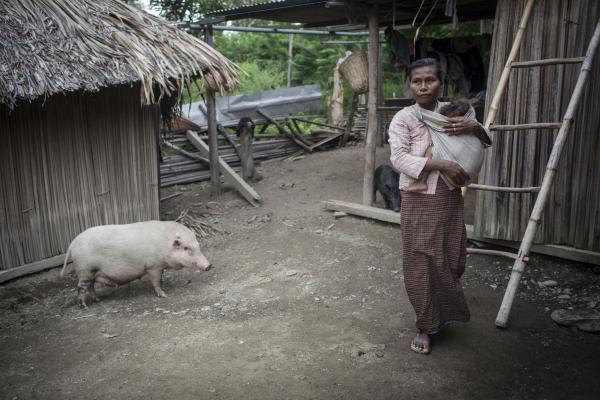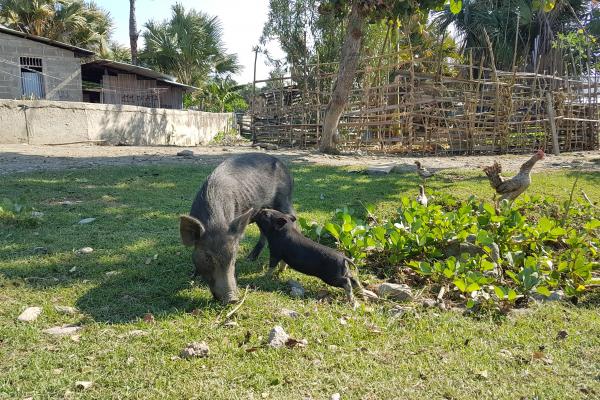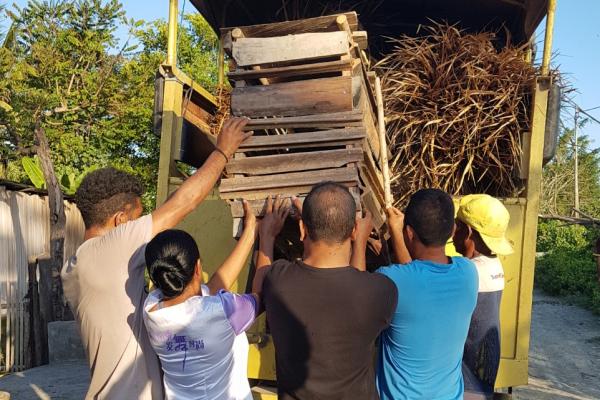



Two epidemics threatening Timor-Leste - COVID-19 and African swine fever
Rapid spread of ASF in Timor-Leste facilitated by freely roaming animals and swill feedingAfrican swine fever (ASF) is a highly contagious disease with a near-100% mortality rate and no vaccine or treatment. In its march from Africa to Europe and, most recently, to Asia, it has left hundreds of millions of the world’s pigs dead in its wake. The first recorded outbreak of ASF in Asia was in China in August 2018. Since then, it has appeared in a dozen other Asia–Pacific countries, including Timor-Leste.
High economic, cultural and social value
To date, much of the research on ASF has focused on technical aspects of disease surveillance and response. But for nations like Timor-Leste, where most pigs are raised by smallholder farmers, the disease also threatens to undermine the fabric of entire communities.
In Timor-Leste, for example, a family unable to provide a pig for cultural ceremonies incurs a ‘debt’ that may prevent restocking and may have to be carried by the next generation as well.
Dr Joanita Bendita da Costa Jong from Timor-Leste’s Ministry of Agriculture and Fisheries says that in her country a typical household owns at least one pig. Large animals are valued at up to US$1,000 (A$1,500)—a significant asset in a country where 75% to 80% of the population makes a living through subsistence farming and where the annual GDP per capita is around US$1,200 (A$1,800).
"Boiling food scraps before feeding these to livestock or building small household pens to contain animals are practical options for smallholder farmers in low income countries."
--
Pigs in Timor-Leste are tied to social status, particularly for women, and often provide a cash reserve or livestock ‘bank’ to pay for healthcare, education, food or other out-of-pocket costs.
Farmers are finding it increasingly difficult to restock after having lost animals, says Dr Jong, because eight of Timor-Leste’s 13 municipalities have already tested positive for ASF and further testing has been put on hold until coronavirus movement restrictions are lifted.
Problems of swill feeding
SF spreads when healthy pigs come into contact with infected sick or dead pigs or with contaminated farm equipment, clothing or meat scraps.
The hardy virus can survive in chilled, dried and frozen meat and in cured pork products and pet food—for months or even years. There is, however, no evidence that ASF affects humans and infected meat is not considered harmful for human consumption.
Experts say one factor facilitating the rapid spread of ASF in Timor-Leste is the practice of allowing animals to roam freely and scavenge for food scraps and of feeding them with swill (food scraps that contain animal material or have been in contact with animal materials).

A further challenge for Timor-Leste’s agricultural agencies is that ASF symptoms mimic those of classical swine fever (CSF): a disease that has been in the country for many years. Unlike ASF, however, CSF outbreaks tend to abate seasonally, giving local stocks time to recover.
Dr Jong says Timor-Leste will need help addressing the under-resourcing of its veterinary services and capacity in order to carry out definitive diagnostic testing to generate a more accurate picture of ASF distribution within its borders.
A strategic, regional response
A new ACIAR-supported project—based at the University of Queensland (UQ) and led by Dr Dominic Smith—is coordinating a strategic effort in partnership with regional and international stakeholders to develop a tool to assess the impact of ASF on livelihoods and the broader national economy.
The hope is that this tool will allow governments, agencies and donors to better inform policy decisions around the long-term approach to ASF control in the Asia–Pacific region, drawing together epidemiological information and socioeconomic data on the disease’s impacts so that investments to control ASF in the region can be better coordinated.

At a forum held by ACIAR and UQ in Canberra in early March, Dr Smith and Dr Jong discussed the challenges and impacts of ASF in the region with economics and animal disease experts from Indo–Pacific nations, ACIAR, the Food and Agriculture Organization of the United Nations, the World Organisation for Animal Health, the International Livestock Research Institute, Australian government agencies and universities, CSIRO and Australian Pork Limited.
Veterinary scientist Dr Tarni Cooper, a member of the UQ team, says Australia’s pig-farming sector is protected by good biosecurity, surveillance and monitoring systems, particularly at airports, and stricter pig-farming practices. In Australia, swill-feeding is illegal, she notes; disease risk is further reduced by containing animals in piggery sheds or pens.
Smallholder farmers in low-income countries, however, cannot afford such practices. More practical alternatives, says Dr Cooper, might include educating smallholders to boil food scraps before feeding these to livestock or to build small household pens to contain their animals.
‘This is the crux of our research: how to help authorities and investors in neighbouring countries assess the economic, cultural and social impacts of ASF control on smallholder farmers so that they have better information and resources for decision-making,’ she adds.

ASF work ‘not stopping for coronavirus
With the Timor-Leste ASF outbreak having occurred only six months before the COVID-19 pandemic hit in mid-March, life for Dr Jong—a member of her country’s COVID-19 and ASF taskforces—is incredibly hectic.
She says the Timor-Leste Government remains firmly committed to controlling ASF, despite movement restrictions that will delay plans to begin pilot testing the UQ framework in July and to collect and test samples from municipalities designated as negative for ASF.
‘Food security underpins the future security of our country,’ Dr Jong explains. ‘If we don’t invest in sustainable agriculture now, the next time a pandemic such as COVID-19 hits we will become even more unstuck.’








